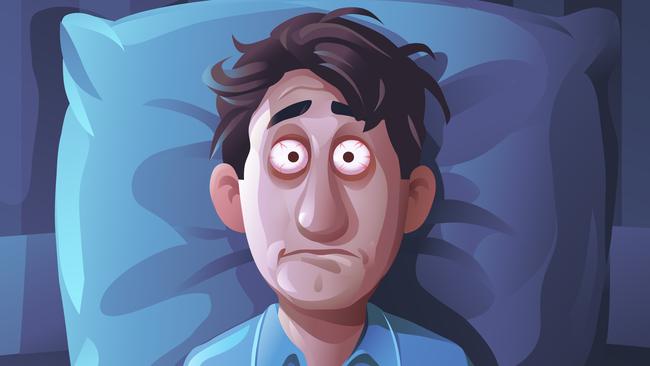Diagnosed with insomnia? Here’s how I get more sleep
In my quest for beauty sleep, I’ve tried everything from aromatherapy and melatonin to acupressure and camomile tea. But alas. Each temporary fix has been exactly that: a passing relief.

In my quest for beauty sleep, I’ve tried everything from aromatherapy and melatonin to acupressure and camomile tea. But alas. Each temporary fix has been exactly that: a passing relief.
Seven years ago, I was diagnosed with insomnia. After multiple trips to the doctor, they confirmed that the source of my body aches, back pains, irritation and mood swings was sleepless nights. My job at the time required heavy travel. Back-to-back flight schedules wreaked havoc on my already disturbed sleep patterns, along with a cocktail of stress, multi-tasking and hormones. Of course, travel isn’t much of an issue these days. With lockdowns, restrictions, health concerns and an economic slowdown, there are new things to keep me up at night.
If you are tired most days, and have trouble retaining information and concentrating, you might be fighting a similar battle. Adults need at least seven to nine hours of sleep to function properly, and today, very few of us are hitting those numbers.
Matthew Walker, director of the Center for Human Sleep Science at the University of California, Berkeley, refers to our being in the midst of a “catastrophic sleep loss epidemic.” Recent studies show a rise in sleep disorders like insomnia and hypersomnia associated with the pandemic. Across the US alone, the number of prescriptions filled for sleep disorders increased by 14.8 per cent between February 16 and March 15 compared with the same period in 2019.
Sleep deprivation not only affects our moods, but also our health. That’s why, for seven years, I’ve been trying to figure out how to battle this epidemic. I’ve read various studies and reports, gathered anecdotal evidence, and talked to allopathic and homeopathic medical professionals. Today, my sleep still isn’t perfect, but it has gotten much better.
Here are some tips I picked up along the way:
Pay attention to your patterns
My friend, a homeopathic doctor, gave me some sound advice: Look at your full day to identify the causes of insomnia — not only the few hours before you go to bed. This year, I began looking for patterns of what could be triggering my sleepless nights. Was it something I was eating? Did it have to do with stress or the amount of physical activity?
I realised that when I had too many meetings or when I was not allowing myself to take a break in the afternoon, I was often too wound up to fall asleep later that night. Scheduling my most intense work in the mornings, slowing down after lunch and doing mundane tasks, like clearing my mailbox in the evening, has worked wonders. Look for these ebbs and flows in your own day. Small adjustments can make a big difference.
Experiment, experiment, experiment
Locking down what works for you will be a game of trial and error. On top of all my sleep experiments, I tried “smart” mattresses, apps such as Headspace and even remedies like tying fenugreek seeds in a cheesecloth and applying them to specific pressure points before bed (as advised by an acupressure specialist). None of these worked for long.
I also tried some mindfulness meditation — a suggestion from my yoga teacher. Mindfulness meditation teaches you how to slow down your thoughts and be more aware of your mind and body by using breathing techniques. The goal is to shift your attention. Instead of reflecting on the past or daydreaming about the future, focus on moment-by-moment experiences, thoughts and emotions.
People who, like me, are triggered by stress may find this practice useful. According to Dr. Herbert Benson of the Harvard-affiliated Benson-Henry Institute for Mind Body Medicine, mindfulness meditation evokes something known as the relaxation response — a deep physiological shift in the body, the opposite of the stress response.
A daily session of 20-odd minutes helps me slow down. When that doesn’t work, I have tried knitting. The repetition calms me. You’ll need to experiment to figure out what works best for you, too.
Treat your bedroom like a sacred place
Since the pandemic began, more of us are working from home, which means we could be working, eating, lazing and sleeping all in the same place — our beds. Research shows that if you bring your work to bed, you’re likely to continue thinking about it even after you’ve “switched off.” I made this mistake in the initial days of working from home and have several nights of no sleep to show for it. Make an effort to carve out a separate work area — it may be your kitchen table or a small nook in your living room. Reserve the bed for sleep, and only sleep.
Test these two overhyped methods
Two methods I’ve found quite effective are cutting out caffeine after noon and limiting blue light at bedtime. The sudden silence I’ve experienced during lockdown has made me more aware of the relentless stimuli we face daily — talking, texting, absorbing a cacophony of voices (inside and outside our heads), travelling and multi-tasking at all times.
I’ve learnt to disengage from all electronic devices, especially those with screens, after 9pm because the blue light messes with our melatonin and makes it hard to sleep. I still have a way to go. If I slept four hours a night before, now I sleep for six and I can see a remarkable difference in my energy levels.
You can get there too. It will require patience and hard work, but your sleep can improve with some trial and error, and an effort to understand your body and its rhythms.
-
Apurva Purohit is the president of the Jagran Group.


